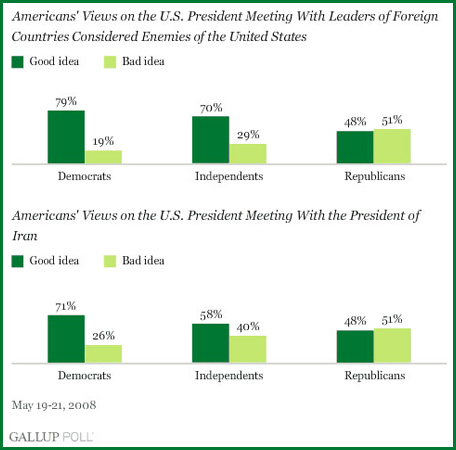
Today, President Bush, in the following video clip, tells us that we face "turbulence in the housing market and slow growth for our overall economy". At the same time, the number of U.S. homeowners in foreclosure or delinquent on their mortgage payments is nearly nine percent, unemployment jumped a full half percent to 5.5%...the largest increase in over two decades, oil jumped by over ten dollars a barrel today...after rising five dollars on Thursday, and the stock market lost nearly 400 points.
Perhaps I don't understand economics, but I have a hunch that the president's use of the words "turbulence" and "slow growth" are inadequate descriptors of what we are experiencing. Unfortunately, the indicators suggest the worst is yet to come. So what is the president's solution? He chose to admonish the Democrats for not making his tax cuts permanent (that would be the same ones that were enacted to fix a sluggish economy) and he called on Congress to pass legislation that would allow more oil exploration (now that we're nearing the end of eight years of a non-existent energy policy...save for Dick Cheney's secret meetings with oil execs).
As George Bush nears the end of his second term, it looks safe to say that he'll exit the White House with a legacy of starting an endless war with little more than a slew of suspect rhetoric and granting the wealthiest Americans one of the largest tax cuts in recent history. But there's more. His policies will leave the rest of the public facing unprecedented gas prices, staggering debt, rising unemployment, and millions of jobs lost or outsourced to foreign countries.
I know, you're thinking I'm being too pessimistic. Not to worry. George Bush, once he chose to admit the economy was in the midst of a "rough patch" (that's code for a deep recession) also gave millions of Americans a paltry stimulus check that might allow them to pay off some of the credit card debt they've amassed in order to survive the "fundamentally strong economy" the president insisted existed despite evidence to the contrary.
As I looked for the words to describe the president's anemic performance in dealing with the economy, I couldn't help but think about the highly touted stimulus package. Unfortunately, my mind chose to rearrange the words to better explain the reality of the president's embarrassing performance...a performance that should have culminated in an admission that we're dealing with a fully flaccid economy.
With a healthy sprinkling of sarcasm, and an abundance of antipathy, I think this administration has exhibited all the signs of a serious case of "ED"..which is rather surprising since its leader spent most of his eight years prancing around like the biggest cock in the barnyard. In my opinion, the last thing America needed was a president obsessed with puffing his feathers and stimulating his own package. Then again, once George Bush exits the White House, I suspect one would be hard pressed to identify many Americans who didn't feel violated.
Tagged as: Deficit, Dick Cheney, Dow Jones, Economy, Energy Policy, Foreclosures, George W. Bush, Iraq, Oil Dependency, Outsourcing, Recession, Sub-Prime Mortgage Crisis, Tax Cuts, Unemployment
Daniel DiRito | June 6, 2008 | 1:31 PM |
link
| Comments (1)


John McCain likes to ridicule Barack Obama's belief that we should meet with the leaders of nations we consider to be our adversaries. A new Gallup poll might have John McCain rethinking this rhetoric. If the polling is accurate, it seems clear that voters don't believe that a continuation of George Bush's "cowboy diplomacy" is a wise strategy.
From Gallup:
PRINCETON, NJ -- Large majorities of Democrats and independents, and even about half of Republicans, believe the president of the United States should meet with the leaders of countries that are considered enemies of the United States. Overall, 67% of Americans say this kind of diplomacy is a good idea.
The issue of using presidential diplomacy with U.S. enemies distinguishes Barack Obama from the presumptive Republican presidential nominee, John McCain, and even from his opponent for the Democratic nomination, Hillary Clinton.
Obama is the only one of the three who has said he would personally meet with the leaders of countries like Iran, Syria, Cuba, and Venezuela as president, and he recently defended his position by saying "strong countries and strong presidents talk to their adversaries." Clinton has criticized Obama's approach as "naïve," and McCain has been unrelenting in his attacks on the issue, accusing Obama of being dangerously inexperienced and having "reckless judgment."
Frankly, the rationale behind the Bush approach has always been suspect. There just isn't ample evidence to suggest that refusing to meet with these leaders provides any measurable benefit. In my opinion, the problem with men like George Bush may well originate with their own awareness of their inability to engage in thoughtful dialogue or protracted negotiations.
Whether this reticence is the result of a questionable intellect, a fragile ego, a bellicose bravado, or some combination thereof may never be fully understood. Regardless, I suspect that the passage of time will reveal more of the motivations that led George Bush and his like-minded cronies to adopt such a strident strategy.
From my perspective, men like George Bush believe that a safe nation can only be achieved by presenting America's persona as a powerful preemptive presence in the world. Instead of adopting the oft referenced historical approach of "speak softly and carry a big stick", the Bush administration seems to have chosen to speak loud and large while swinging a big stick... indiscriminately.
Truth be told, the Bush-McCain machismo is contrary to the conflict resolution that most of us have been reared to respect. From our first adventure in socialization as a school child to the many years we spend navigating the difficulties that frequently characterize the workforce, we learn that the best resolutions often result from difficult, though diplomatic, dialogue. If one were to imagine either our schools or our places of employment utilizing the Bush-McCain mentality, it is virtually impossible to visualize a functional environment.
Granted, conducting foreign policy is far more complex than the above referenced experiences, but any situation involving human interaction can ultimately be reduced to the need for individuals to engage in constructive communications...even if those communications are with an obvious and obstinate enemy.
Perhaps the worst consequences of the Bush-McCain strategy is the collateral damage that accompanies this ideological intransigence. An example might be helpful. Time and again we've heard discussions of the degree to which a large segment of Iran's population is in sync with the West...even to the extent that they might, at some point, entertain and enact some type of people's revolt to overthrow their radical religious regime.
Unfortunately, though the Bush administration occasionally invokes the sensibilities of the Iranian citizenry, he and his minions more frequently rattle off the rhetoric that suggests we revile and reject all things Iranian...and Islamic. In so doing, we alienate those Iranians...and millions of Islamists...that might well be our ally (or at least not our mortal enemy) under the right circumstances...circumstances that may never mature in an atmosphere of elevated animosity. As such, they are left unable to distinguish our disdain for their demagogic leaders from our compassion for the common man.
In fact, the events that have led many Americans to distrust the Bush administration are the same ones that have likely undermined our hopes for an internal insurrection in Iran. Hence, one of the fundamental benefits of a direct dialogue with the leadership of Iran is the message it would send to the people of Iran. We can't expect Iranians and the rest of the world to see the United States as a force for good unless we demonstrate that goodness is our preferred means of force.
Look, I have no illusions that goodness is a force that can solve all conflicts...and I'm sure the American public feels the same. At the same time, underlying all acts of physical force must be the perception that they have been enacted as a last resort, by good people, who have concluded that good order (safety and security) cannot be restored otherwise. In this way, goodness can remain the fundamental attribute and the means by which a nation of America's strength and power can be seen as both a giant capable of imposing its will...and also as a benevolent big brother who chooses to insure that the will of the individual will not be arbitrarily abridged.
Cowboy diplomacy is a rich relic of our Old West history. It should remind us of where we've been and where we've arrived. An awareness of that journey should illuminate our growing commitment to civility; not our willingness to suspend it. In the end, we are strongest when our rational and reasoned restraint is the force by which the world finds the courage to reject and resist conflict. Each time a calamity is prevented because of it, America...and the world...grow even stronger.
America leads the world best when others choose to follow her on her journey to make it the best world she can lead. The future has patiently awaited her return. After eight long years, she must turn around and move forward. When she does, the world will once again follow.
Tagged as: Barack Obama, Cowboy Diplomacy, Gallup Poll, George Bush, Iran, Iraq, Islam, John McCain, Mahmoud Ahmadinejad
Daniel DiRito | June 2, 2008 | 6:00 PM |
link
| Comments (0)



![]()
![]()
